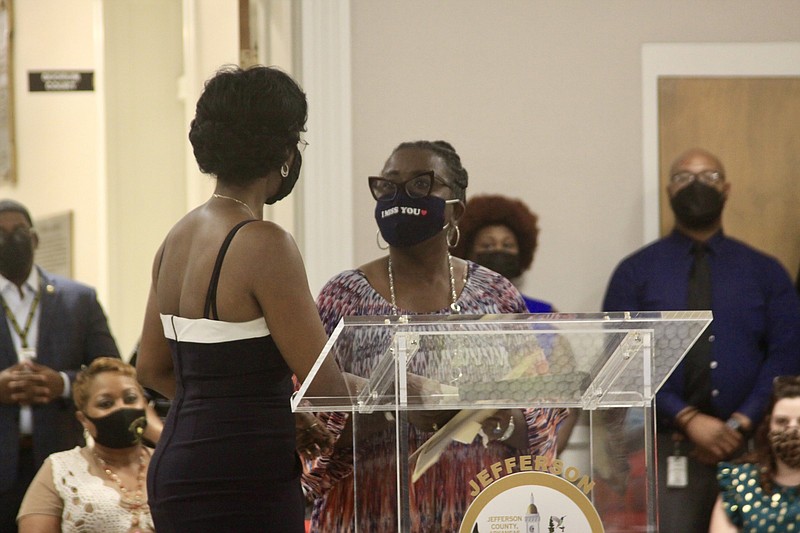Covid-19 survivor benefits will be distributed Monday by County Judge Gerald Robinson and the Quorum Court after the Budget and Finance Committee approved a $183.323.72 appropriation to the Coronavirus Relief Fund Special Project during Tuesday's committee meetings.
Last month, the Quorum Court provided nine recipients with direct cash payments. The recipients, all women, were either widows of covid-19 victims or children who were caretakers of parents who died from the disease.
Those recipients received between $4,308.50 and $25,000.
The Quorum Court approved a motion in August to provide these benefits to families through an application process after Robinson requested that the American Rescue Plan money have an expenditure line created for the Survivor's Benefits Fund.
Robinson could be the only county judge implementing the fund. Christi Smith of the Association of Arkansas Counties said she hadn't heard of any other counties awarding such benefits.
Congress passed the American Rescue Plan to help communities in counties and cities combat the financial impact of covid-19. Robinson said the final "rule" section of the plan provides direct cash payments to those who lost their spouses or parents to covid.
This time around, Robinson said, there were many male applicants who will be recipients of the funds on Monday.
"Jefferson County recorded the first covid-19 case in the state of Arkansas and recorded among the highest death toll in the state," Robinson said. "Due to these factors, Arkansas families have been greatly impacted economically by the loss of loved ones."
Robinson said each applicant must provide qualifying documentation and meet certain criteria in order to be approved for funding. There's also a formula, Robinson said, that determines how much each survivor will get.
Explaining the formula, Robinson said it begins with the maximum amount of the benefit award, $25,000.
"Taking 100%, we broke it down into four categories of 25%," Robinson said.
Those categories include loss of revenue, amount of funeral expenses, amount of hospital expenses and amount of joint household debt (i.e., credit cards and joint bank loans).
"When you break that down, if a person's income revenue was $50,000, 25% of their income is $12,500," said Robinson. "What we did is we total up each category, and that's how we came up with the amount."
Loss of revenue from the household because a spouse's death would be the yearly gross income that the spouse brought to the household. The amount that the funeral cost, regardless of whether an insurance policy was in place, is also taken into account.
Also considered is the remaining balance of hospital bills after the insurance is paid. If there's no insurance and the remaining balance is not written off by the medical facility, then the spouse could receive the maximum benefit based on that.
At Robinson's discretion, he can also award the maximum benefit to the survivor if there is no other financial support.
The total household debt is also considered, and 25% of the total bills are tallied.
"If a person received any federal funds from FEMA or any state funds, we subtracted that amount from the yearly income of the deceased person, then did the 25% from that amount," Robinson said. "The formula works in that way; everybody is rated the same. Each applicant is given that formula and the information they need."
Qualifying documentation includes the following:
• Marriage License.
• death certificate indicating covid-19 as the cause of death.
• Proof of income of the deceased, i.e., tax return or check stub.
• Burial expense receipt, contract.
• Hospital expenses incurred, if any.
• Proof of guardianship (power of attorney) of parent lost to covid.
• Proof of guardianship of any minor children who lost parents to covid, i.e., birth certificates, adoption papers or any other court documents.
• Documentation of any state or federal funding received for covid-19 death benefits.
In other county business, the Human Resource Committee gave a "do pass" recommendation to the Quorum Court to fill the part-time Victims of Crime Act grant position in Prosecuting Attorney Kyle Hunter's Victim Witness Department.
The position, titled "coordinator assistant," would pay $15 an hour, two days a week, 10 hours a week, for 52 weeks.
The grant would fund the position fully, and the part-time position would not have any benefits, including federal insurance such as Social Security and Medicare, retirement, vacation or sick leave.
"We had three of those VOCA positions, and I lost two of them," said Hunter, adding that he really needed the position filled. "The grant did have enough money to have a part-time position."
Also advanced with a "do pass" recommendation is an ordinance requiring periodic reports from the various county boards and commissions for review by the county judge.
